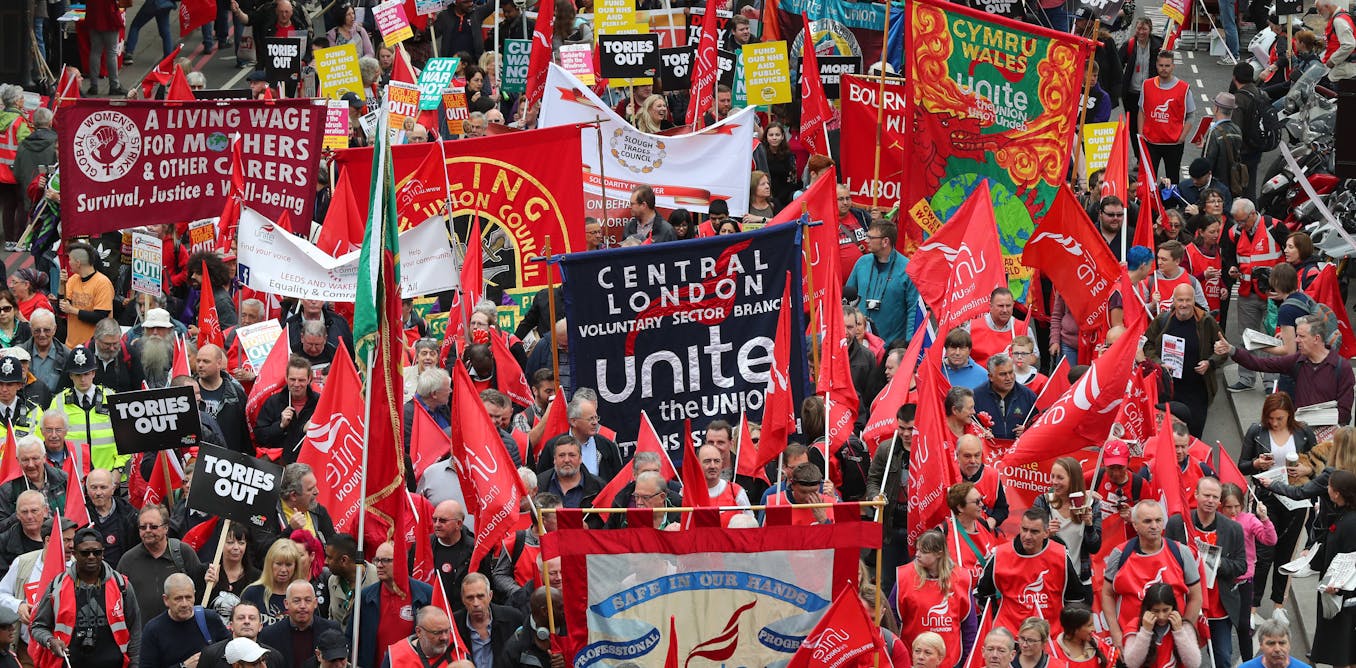 PA/Gareth Fuller
PA/Gareth Fuller
By Gregor Gall, University of Glasgow
The Trades Union Congress (TUC) is celebrating its 150th anniversary at a time of great pressure for workers’ rights. It was founded in Manchester in 1868 as the collective voice for organised labour. Today, its strapline is “changing the world of work for good”. The anniversary is an opportunity to reflect upon how the TUC, along with its union affiliates, can adapt to the considerable current challenges it faces in seeking to change the world of work for good.
As part of the labour and union movement, the TUC has played a major part in winning historic victories on pay, hours and conditions for workers. Wages are higher and conditions better for unionised workers than those not in a union. But since 1979, and even with Labour governments between 1997 and 2010, the worth of the victories has been eroded, if not quite undone. Job losses, long working hours, pensioner poverty and gender discrimination at work are still serious problems. There are many reasons why the TUC is still needed.
But to “change the world of work for good”, the TUC needs to recreate the power it previously wielded to right these wrongs. Otherwise, it is just a bystander and one voice among many. The scale of the task is underlined by the similarity of labour market conditions in 2018 to those in 1868, especially with regard to low pay, insecure work and the working poor.
There have always been two ways for workers to exercise influence – through the industrial and political arenas. Politically, the times are more auspicious now than they have been for a generation. Having Jeremy Corbyn at the head of Labour party after a better than expected performance in the 2017 general election means a government more in line with TUC policies has never been closer than since the early 1990s.
Tough times for unions
Whether Labour is elected to office or not, the TUC and its 49 affiliated unions comprising 5.5m members have to be able to grow and prosper. But membership, as of 2017, is half of what it was in 1979. It is also that there are some almost non-union parts of the economy. So, these same figures show that the private sector has a union density of just 13.5%, less than 10% of young workers are members, density is highest (40%) among older workers who will retire in the medium term, and with a growing workforce even if absolute membership remains stable, union density still falls.
Members are also becoming less assertive. Last year saw just 79 strikes in the UK and the lowest number of workers involved in them since records began in 1893. The restrictions introduced in 2016 via the Trade Union Act might have made the situation worse but they cannot account for the existing trend of falling strike levels since the 1990s.
So what can be done? The TUC is developing plans to specifically target young workers for recruitment, but this will take time to come to fruition. The same is true of the encouraging signs of younger workers in McDonald’s and TGI Friday’s striking to assert their interests.
Recent initiatives suggest that the two problems can be addressed together. Unions can increase both membership and assertiveness in a virtuous upward spiral. In its recent pension dispute, the University and College Union, like other unions, found standing up against employers through striking brings in many recruits – over the last year, UCU membership grew by 16,000.
So more individual strikes would be beneficial but these cannot be magicked out of thin air. Neither can a return to the periods of mass strikes (like the late 1910s) which brought huge increases in membership.
Membership by default
In a recently published paper, a number of academics proposed a union default system. Britain’s system is a non-union default. Workers have to expressly choose to join – and can be dissuaded from doing so by employers and governments.
Under a union default, all workers are automatically members. This is not compulsory membership or closed shop by the backdoor because workers have the right to opt out. The right to be the default union is secured by passing a support threshold. This would bring with it the right to bargain over pay and conditions. By law, employers would have no role to play in choosing the union.
Most workers would not opt out because there is unmet demand for union representation and workers would quickly see the tangible collective benefits of membership on their pay and conditions. The default system would lead unions to be stronger and better resourced as well as enabling the more difficult to organise sectors to be organised.
Only this union default system is capable of creating a level playing field for unions to bargain upon with employers. Otherwise, unions will always be at a disadvantage of having insufficient resources and reach to organise the vast majority of workers who are now non-union, as well as bargain successfully for them.
Under Corbyn, Labour has already adopted the radical Manifesto for Labour Law, which sets out major reforms for workers’ rights, including strengthening union representation. A union default could be added to the list. If the TUC and unions can make sure that the next Labour general election manifesto contains these reforms and a union default system as well as ensuring that Labour is elected to government, they will have shown how working to make combined advances in both the industrial and political arenas can make the overall outcome greater the sum of its parts. Only then can they be protected from the current system of neo-liberal capitalism and employer dominance.
Gregor Gall, Affiliate Research Associate, University of Glasgow
This article was originally published on The Conversation. Read the original article.


Be the first to comment